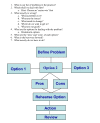Delivering the WISE (Whole Systems Informing Self-Management Engagement) training package in primary care: learning from formative evaluation
- PMID: 20181050
- PMCID: PMC2841580
- DOI: 10.1186/1748-5908-5-7
Delivering the WISE (Whole Systems Informing Self-Management Engagement) training package in primary care: learning from formative evaluation
Abstract
Background: The WISE (Whole System Informing Self-management Engagement) approach encompasses creating, finding, and implementing appropriate self-care support for people with long-term conditions. A training package for primary care to introduce the approach was developed and underwent formative evaluation. This entailed exploring the acceptability of the WISE approach and its effectiveness in changing communication within consultations. The study aimed to refine the patient, practitioner, and patient level components of the WISE approach and translate the principles of WISE into an operational intervention deliverable through National Health Service training methods.
Methods: Normalisation Process Theory provided a framework for development of the intervention. Practices were recruited from an inner city Primary Care Trust in NW England. All practice staff were expected to attend two afternoon training sessions. The training sessions were observed by members of the training team. Post-training audio recordings of consultations from each general practitioner and nurse in the practices were transcribed and read to provide a narrative overview of the incorporation of WISE skills and tools into consultations. Face-to-face semi-structured interviews were conducted with staff post-training.
Results: Two practices out of 14 deemed eligible agreed to take part. Each practice attended two sessions, although a third session on consultation skills training was needed for one practice. Fifty-four post-training consultations were recorded from 15 clinicians. Two members of staff were interviewed at each practice. Significant elements of the training form and methods of delivery fitted contemporary practice. There were logistical problems in getting a whole practice to attend both sessions, and administrative staff founds some sections irrelevant. Clinicians reported problems incorporating some of the tools developed for WISE, and this was confirmed in the overview of consultations, with limited overt use of WISE tools and missed opportunities to address patients' self-management needs.
Conclusions: The formative evaluation approach and attention to normalisation process theory allowed the training team to make adjustments to content and delivery and ensure appropriate staff attended each session. The content of the course was simplified and focussed more clearly on operationalising the WISE approach. The patient arm of the approach was strengthened by raising expectations of a change in approach to self-care support by their practice.
Figures
Similar articles
-
Implementing, embedding and integrating self-management support tools for people with long-term conditions in primary care nursing: a qualitative study.Int J Nurs Stud. 2014 Aug;51(8):1103-13. doi: 10.1016/j.ijnurstu.2013.11.008. Epub 2013 Nov 27. Int J Nurs Stud. 2014. PMID: 24373719
-
Implementation of a self-management support approach (WISE) across a health system: a process evaluation explaining what did and did not work for organisations, clinicians and patients.Implement Sci. 2014 Oct 21;9:129. doi: 10.1186/s13012-014-0129-5. Implement Sci. 2014. PMID: 25331942 Free PMC article.
-
Promoting and supporting self-management for adults living in the community with physical chronic illness: A systematic review of the effectiveness and meaningfulness of the patient-practitioner encounter.JBI Libr Syst Rev. 2009;7(13):492-582. doi: 10.11124/01938924-200907130-00001. JBI Libr Syst Rev. 2009. PMID: 27819974
-
Current experience and future potential of facilitating access to digital NHS primary care services in England: the Di-Facto mixed-methods study.Health Soc Care Deliv Res. 2024 Sep;12(32):1-197. doi: 10.3310/JKYT5803. Health Soc Care Deliv Res. 2024. PMID: 39324475 Review.
-
Digital First Primary Care for those with multiple long-term conditions: a rapid review of the views of stakeholders.Health Soc Care Deliv Res. 2024 Jul;12(21):1-68. doi: 10.3310/AWBT4827. Health Soc Care Deliv Res. 2024. PMID: 39056123 Review.
Cited by
-
Application of normalisation process theory in understanding implementation processes in primary care settings in the UK: a systematic review.BMC Fam Pract. 2020 Mar 16;21(1):52. doi: 10.1186/s12875-020-01107-y. BMC Fam Pract. 2020. PMID: 32178624 Free PMC article.
-
Supporting translation of research evidence into practice-the use of Normalisation Process Theory to assess and inform implementation within randomised controlled trials: a systematic review.Implement Sci. 2023 Oct 27;18(1):55. doi: 10.1186/s13012-023-01311-1. Implement Sci. 2023. PMID: 37891671 Free PMC article.
-
Aiming to improve the quality of primary mental health care: developing an intervention for underserved communities.BMC Fam Pract. 2014 Apr 16;15:68. doi: 10.1186/1471-2296-15-68. BMC Fam Pract. 2014. PMID: 24741996 Free PMC article.
-
A cluster randomised controlled trial of the clinical and cost-effectiveness of a 'whole systems' model of self-management support for the management of long- term conditions in primary care: trial protocol.Implement Sci. 2012 Jan 26;7:7. doi: 10.1186/1748-5908-7-7. Implement Sci. 2012. PMID: 22280501 Free PMC article. Clinical Trial.
-
Normalisation process theory: a framework for developing, evaluating and implementing complex interventions.BMC Med. 2010 Oct 20;8:63. doi: 10.1186/1741-7015-8-63. BMC Med. 2010. PMID: 20961442 Free PMC article.
References
-
- Department of Health. The NHS Plan. A plan for investment A plan for reform. The Stationery Office [July]. London; 2000.
-
- Department of Health. The NHS improvement plan - Putting people at the heart of public services. London, The Stationery Office; 2004.
-
- Wanless D. Securing Our Future Health: Taking A Long-Term View. HM Treasury, London; 2002.
-
- Department of Health. Self care: A real choice - Self care support: A practical option. Gateway reference 4401. 2005.
-
- Bower P, Blakeman T, Kennedy A, Protheroe J, Richardson G, Rogers A, Sanders C. What influences people to self care? University of Manchester, National Primary Care Research and Development Centre; 2009.
Grants and funding
LinkOut - more resources
Full Text Sources



